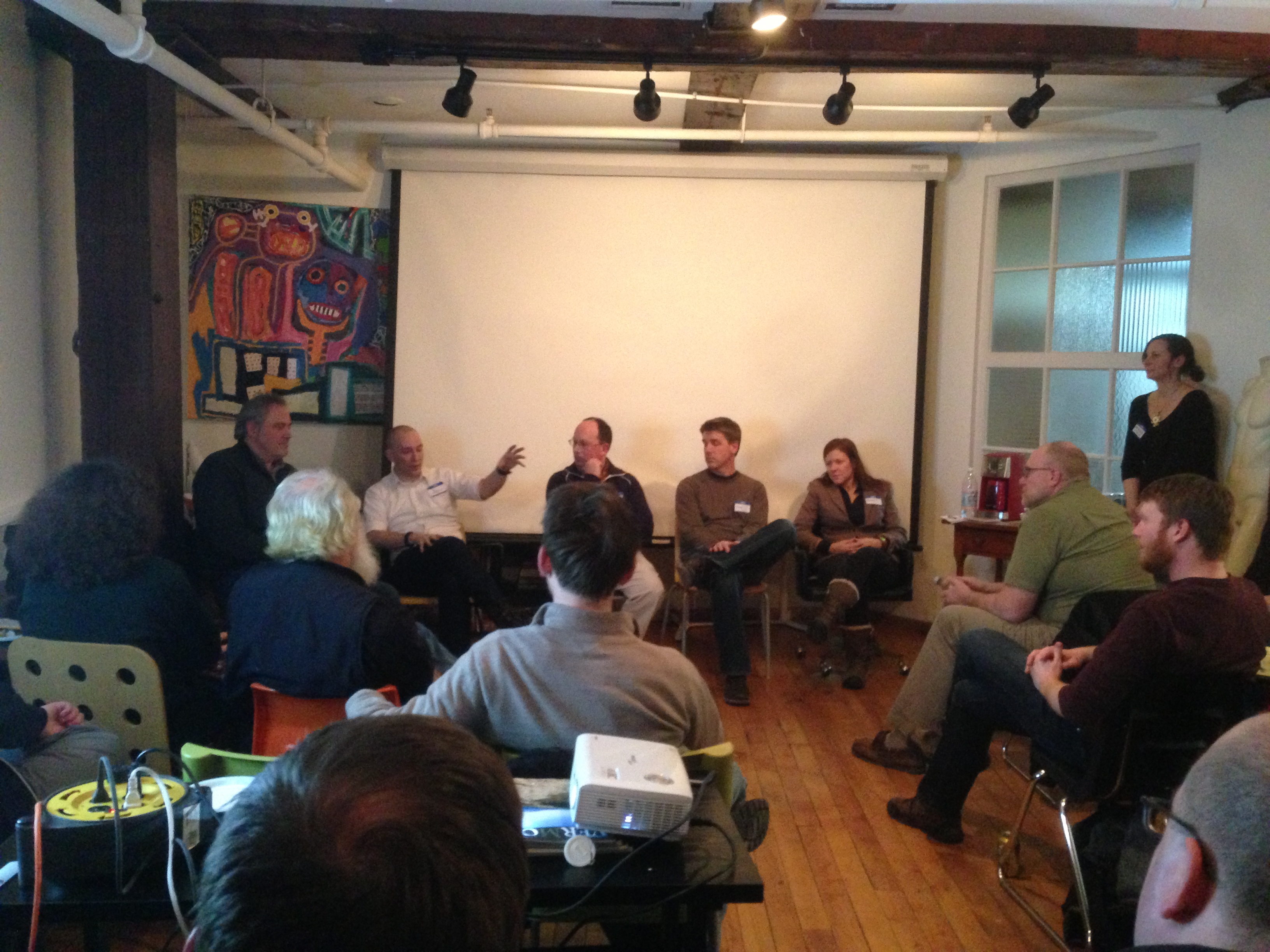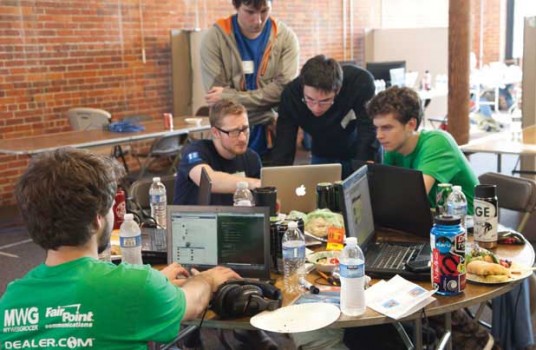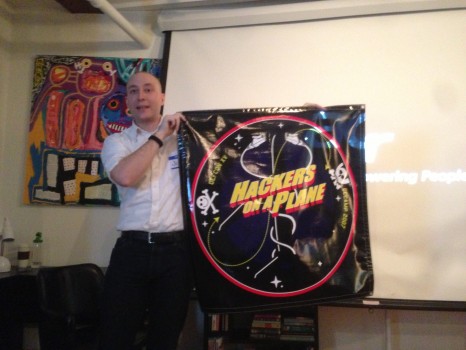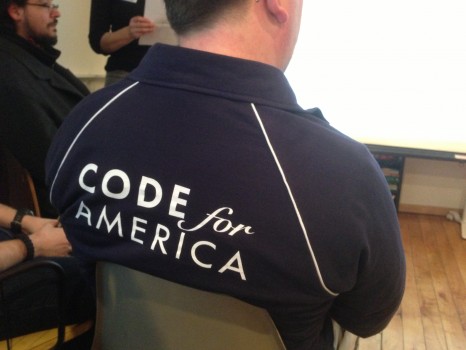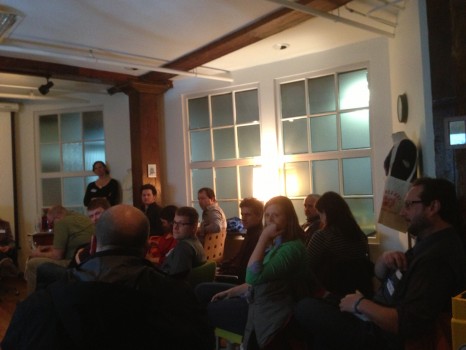Above photo: Panel members, L to R: Doug Webster, Jesse Krembs, Bradley Holt, Nate Herzog, Rebecca Roose. Standing: Amanda Levinson.
Vermont’s tech economy has gotten a big boost over the last few years from the proliferation of hackathons and makerspaces. Hackathons are events during which developers design applications related to a specific theme. Makerspaces are essentially communal workshops that attract artists, coders, welders, engineers and tinkerers — aka makers.
Nobody profits from these mostly noncommercial projects, but, in a sense, we all do. They help sustain the ecosystem that supports companies such as Pwnie Express, a Berlin-based cyber-security firm that landed $5.1 million in venture capital investment last year.
On Monday, February 10, a group of hackathon and makerspace organizers gathered to talk about their initiatives and the role they play in fostering innovation in Vermont. Uber-connected technology consultant and BTV NetSquared cofounder Amanda Levinson organized the panel discussion, which took place at The Karma Bird House in Burlington.
About 40 people crammed into the Renegade Writer’s Collective office space to hear the five presenters: Nate Herzog, founder of StoryHackVT; Jesse Krembs, cofounder of the Hacker Foundation and Laboratory B, Burlington’s community hackerspace; Bradley Holt, Code for BTV Brigade Captain and organizer of civic hacking events; Rebecca Roose, Senior Product Marketing Manager for MyWebGrocer, which presents HackVT, a 24-hour competitive hackathon with cash prizes; and Doug Webster, the state’s Center for Technical Education coordinator and founder of the Champlain Maker Faire. It was an all-star panel; indeed, during her introduction, Levinson noted that the gathering included “a large part of the hackathon and makerspace brain trust of Vermont.”
The presenters took turns describing their projects, most of which were likely familiar to the audience. Herzog went fist. He described his 24-hour StoryHackVT competition last October as “a hackathon for creatives.” It drew 55 participants, who competed on 15 different teams to produce a narrative on three or more digital platforms. He’s already started planning his 2014 competition, and announced a new project: next Monday, he’s launching a Vermont chapter of StoryCode, an organization for immersive digital storytellers. Its first meeting will also take place at the Karma Bird House, and will feature work by Katie McCurdy, organizer of the Burlington Healthcare Innovators group, and Marguerite Dibble of Burlington-based video game studio Birnam Wood Games.
Krembs, a data network planner for FairPoint Communications, went next. He was there representing Laboratory B, a community hackerspace that invites the public to participate in workshops and hands-on activities. It hosts a semi-regular “Satoshi Square,” a meetup devoted to local uses for Bitcoin and other crypto currencies, and is currently encouraging its members to fight back against spying by the National Security Agency. But Krembs didn’t talk about that at the panel — he described how he helped bring hackerspaces to the U.S. by organizing a tour for other hackers to visit some in Germany. He and his cohorts dubbed that effort “Hackers on a Plane.”
Krembs also celebrated the embrace of the word “hacker.” He’s been calling himself one since the late 1990s, but it’s only recently become a respectable term. “I remember when you said the word ‘hack’ and it was like you were a criminal,” he said.
If hacking has become more respectable, it’s in part because of do-gooders like Bradley Holt, one of Vermont Business Magazine‘s 2011 “Rising Stars.” He’s one of the brigade captains of Code for BTV, the local chapter of Code For America, a volunteer organization of “civic hackers” who put their coding skills to work helping municipalities and nonprofits; Holt’s partner, Jason Pelletier, is his co-captain. The pair attended the event wearing matching Code for America sweatshirts.
Code for BTV made headlines recently when it landed a $30,000 prototype grant from the John S. and James L. Knight Foundation for the Civic Cloud Collaborative. The “civic cloud” will house noncommerical projects that take advantage of Burlington’s gigabit network. Holt and his fellow civic hackers are working on 20 different projects for a variety of organizations, including Vermont music nonprofit Big Heavy World and the Fletcher Free Library. This weekend, the group is organizing a Food Systems Hackathon at the Northeast Organic Farming Association of Vermont’s conference at the University of Vermont. The following weekend, the group hosts a hacking event devoted to open data. “Office hours” at Burlington City Hall are also in the works to help connect programmers with the government agencies that could benefit from their skills.
HackVT, Vermont’s first hackathon, has also tried to make those connections, said Rebecca Roose. The annual event uses open data sets provided by the state of Vermont, and has spawned some interesting ideas from the hundreds of participants who have taken part over the last four years; Roose presented an infographic summarizing HackVT’s impact. Click here to see it.
Roose noted a few competitors have continued to develop some of their apps — Justin Kuzma chimed in and pointed out that his team brought their app, Country Perfume, to the app store. It offers information about Vermont farms. His 2013 team is also working on finishing their app for the Vermont State Parks, which they hope to release this spring.
“That’s what I love to hear,” she said. “It’s got legs.”
But Roose pointed out that MyWebGrocer’s original goal in hosting the hackathon was “to bring people to Vermont and make them stay here… to get the tech community together and put Vermont on the map as a digital hub.” Needless to say, the event plays a role in the company’s recruitment strategy.
Finally, Doug Webster spoke about the Champlain Maker Faire. The first one took place on a Saturday in September, 2012, at Shelburne Farms; the second was a Saturday-Sunday event in the same location. The events were inspired by larger Maker Faires in New York and California. At first, Webster said, people were skeptical that they could round up enough exhibitors in Vermont. But the first Shelburne Farms event drew 50 makers; 1,300 people bought tickets that year. The 2013 event drew 75 makers and 2,400 attendees, many of them families with small children. He’s already planning the 2014 Champlain Maker Faire, which is scheduled for October 4 and 5.
“I think it’s helped in a lot of ways to help grow the culture of innovation,” he said.
Webster invited Christy Mitchell to tell the crowd about Burlington’s new community makerspace, the Generator — Mitchell is its newly minted executive director. The Generator will open in March in the city-owned Memorial Auditorium Annex, and will have a 3D printer, a laser cutter and other equipment for members’ use. The Generator will also have small workspaces for rent.
Webster noted that five other towns — Lyndon, White River Junction, Bennington, Brattleboro and Rutland — are planning similar spaces. There’s a lot of interest out there. “You have a meeting and you expect nine people to show up and 45 people show up,” he said.
After the five panelists spoke, they sat in the front of the room and held a Q&A session. The questions ranged from “How do we engage students?” to “How will you make sure the civic cloud is used for good and not for evil?”
It was a lively discussion that continued all the way until 8 p.m.; the event started at 6. The audience seemed engaged and genuinely interested in creating more opportunities for education and collaboration, despite the fact that many of them had skipped dinner to attend.
As Bradley Holt noted during the panel discussion, it’s that passion and commitment that provides a foundation for the breakthrough tech successes that make the news. “It’s really all that work, all that tinkering, that leads to that,” he said.

